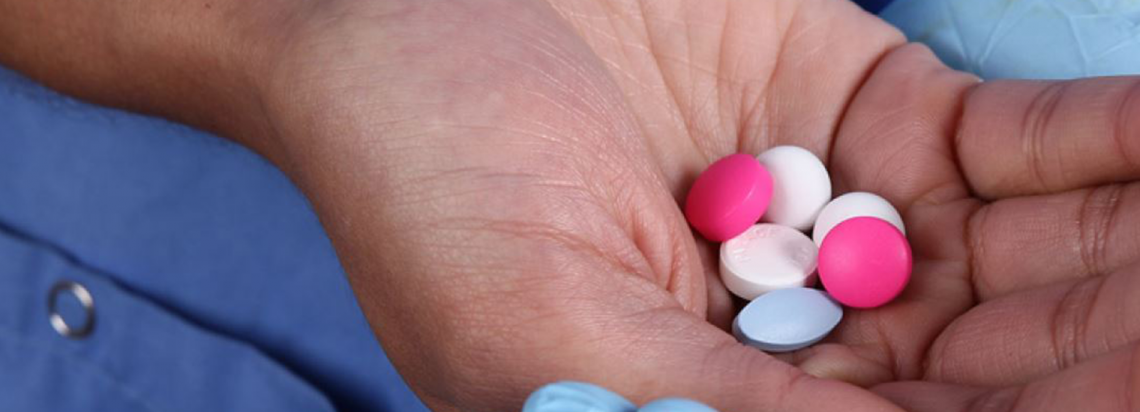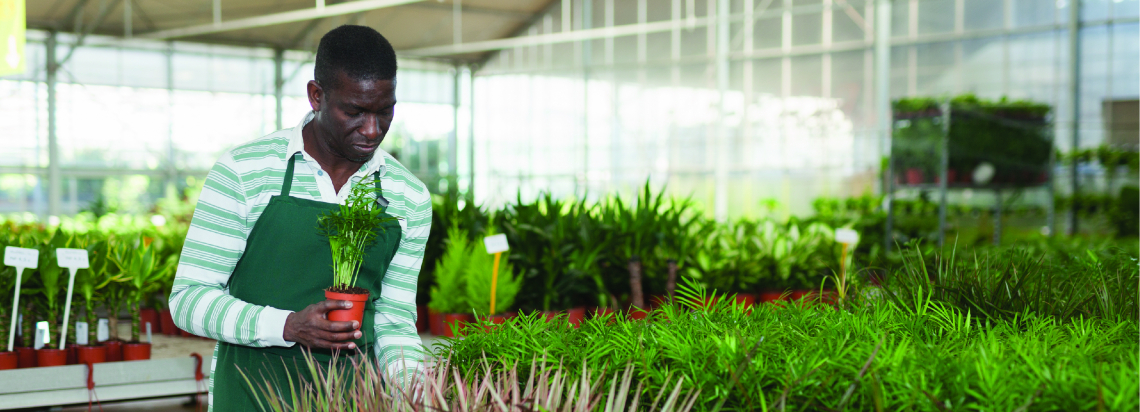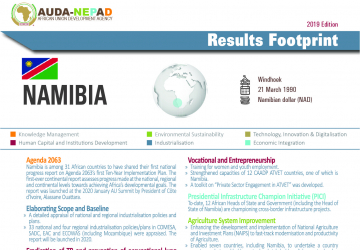 Namibia
Namibia
Official Name: Republic of Namibia
Capital: Windhoek
Independence Day: 21 March 1990
Currency: Namibian dollar (NAD)
Key Result
Over 160 women in Namibia were trained by GenderLinks to understand the nuances that surround standing for political office and were provided with the necessary skills to engage in political activities. Potential female political candidates from all 36 local government councils in Namibia were imbued with the necessary skills to mount realistic challenges for election.
Namibia benefited from funding of 6.0 M EUR secured from the EU to support capacity development, research and innovation in water and sanitation in the Southern and West Africa regions through the NEPAD African Networks of Water Centres of Excellence.
500 farmer and community members were trained in Namibia through the Mushroom Node: the farmers were equipped with cultivation, post-harvest and packaging skills.
A Country Climate Smart Agriculture (CSA) Programme was validated and aligned with the National Visions, National Development Plans and the agriculture sector policies and strategies for Namibia. The Programme integrated CSA approaches on climate change, gender and youth. The programme has resulted in the formation of a regional platform for learning and sharing of experiences.
Following the completion of three case studies in Southern Africa (Botswana, Namibia and South Africa), individual countries were sensitized to incorporate the Home-Grown School Feeding (HGSF) model into existing school feeding programmes, and ensuring that procurement for the programmes was locally sourced.
The Southern Africa Hub Port and Rail Programme project aims at responding to Southern Africa challenge in developing sufficient port capacity to handle future demand from both domestic sources and landlocked countries.
The Multisectoral Investment Opportunity Studies project involves the identification and preparation of investment programmes in the basin.
Related
Projects

A critical AU Model Law aimed at harmonizing medical products regulatory systems in Africa was endorsed by African Heads of State and Government at the January 2016 AU Summit in Addis Ababa, Ethiopia. The AU Model Law will contribute towards accelerate the regulation of safe, quality and affordable medical products and technologies in Namibia.
Following a successful ZAZIBONA Assessors meetings in 2015, a total of 103 products were reviewed. As a result, the ZAZIBONA Heads of Agencies (HoA) recommended a total of 28 products for registration within SADC member states. As a participating member, Namibia successfully registered a total of 13 products and remains committed to the harmonization of medical products registration. The ZAZIBONA HoA also recommended 14 products for non-registration while 61 are pending. The ZAZIBONA scheme is part of the SADC Framework for Regulatory Harmonization and was endorsed by the SADC Regulators Forum. A further four (4) ZAZIBONA Assessors meetings will be held in 2016.

Implemented Home Grown School Feeding Programme (HGSF) – with focus on agriculture development, education, health and nutrition.
A case study was conducted, aimed at strengthening the evidence on the costs and benefits of HGSF to inform national level policy and decision making processes
Home-Grown School Feeding (HGSF) programmes: Following the completion of three case studies in Southern Africa (Botswana, Namibia and South Africa), individual countries were sensitised to incorporate the Home-Grown School Feeding (HGSF) model into existing school feeding programmes, and ensuring that procurement for the programmes was locally sourced.
A mapping of existing school feeding programmes (both regular and Home-Grown-School Feeding HGSF models) in Africa was completed and shows that close to 90 per cent of countries have implemented school feeding programmes, with a growing number adopting the HGSF model.

A roadmap for launching CAADP has been agreed upon.
Technical support was provided to Namibia facilitate the integration of CAADP into mainstream government planning and budgeting processes and policy documents.

Project : TAH programme
Description : This is phase I of the continental connectivity programme that focuses on completion and standardisation of the TAH missing links by 2030
Project : Single African Sky phase 1 (design and initial implementation)
Description : Single African Sky is a continental programme that will create a high-level, satellite-based air navigation system for the African continent
Project : Yamoussoukro Decision implementation
Description : Accelerate Yamoussoukro Decision implementation by identifying countries that are ready to fully implement it, and discussing and agreeing with both their governments and airlines to launch the voluntary club on a full membership basis;
Project : ICT Enabling Environment
Description : This programme would improve the environment for the private sectors to invest in high-speed broadband infrastructure
Project : ICT Terrestrial for Connectivity
Description : This programme has two main components : secure each country connection by at least two broadband infrastructure and ensure the access to submarine cable to all landlocked countries
Project : Internet Exchange Point (IXP) programme
Description : The aim of this programme is to provide Africa with adequate internet node exchange to maximise internal traffic
Project : Central African Interconnection
Description : 3,800 km line from the DRC to South Africa through Angola, Gabon, Namibia and to the north to Equatorial Guinea, Cameroon and Chad
Project : Southern Africa Hub Port and Rail Programme
Description : This programme aims at responding to Southern Africa challenge in developing sufficient port capacity to handle future demand from both domestic sources and landlocked countries
Project : Multisectoral Investment Opportunity Studies
Description : Identification and preparation of investment programmes in the basin
Project : Lesotho HWP Phase II – water transfer component
Description : Water transfer programme supplying water to Gauteng Province in South Africa
Results:
•359 291 women capacitated through CSO and grassroots organizations including 92 Local authorities and state government in the six geopolitical zone of Nigeria. Namibia 13 Council has implemented Action Plan for Gender Aware Service Delivery and 384 Parliamentarian in the region of Tigray, Amhara and Somalia facilitated research support from 250 graduated students for Gender Aware Parliamentarian Oversight.
•74 435 women empowered economic and financial terms: Income generation skills; Deployment of technical assistance to boost agriculture production for both consumption and commercial purposes; Accessing agricultural extension services; Promotion of gender inclusiveness in decision making; Creation of enabling environment to access land; Land tenure and legalization of land title for women; Youth job creation; SME management; Informal and Regional Trade development.
•25 438 women support through institutional based capacity building.
Results:
•359 291 women capacitated through CSO and grassroots organizations including 92 Local authorities and state government in the six geopolitical zone of Nigeria. Namibia 13 Council has implemented Action Plan for Gender Aware Service Delivery and 384 Parliamentarian in the region of Tigray, Amhara and Somalia facilitated research support from 250 graduated students for Gender Aware Parliamentarian Oversight.
•74 435 women empowered economic and financial terms: Income generation skills; Deployment of technical assistance to boost agriculture production for both consumption and commercial purposes; Accessing agricultural extension services; Promotion of gender inclusiveness in decision making; Creation of enabling environment to access land; Land tenure and legalization of land title for women; Youth job creation; SME management; Informal and Regional Trade development.
•25 438 women support through institutional based capacity building.

The Fund supported the alignment of the gender sensitive CSA to the country's NDP.

ASTI has captured comprehensive information on STI and consequently built in-country capacity to collect, analyse & publish data and information on research & development (R&D) and Innovation
Implementation of the ASTII Initiative in Namibia took effect in 2011. The country undertook the first R&D data collection exercise in 2011/12, and accordingly contributed content to the 2nd edition of the African Innovation Outlook.
Three trainings on international survey methodologies (OECD Frascati Family of manuals) were conducted between 2014 and 2015, conducted by the NEPAD/ASTII team with CeSTII, with about 100 people trained.
Contact: Mr. Gernot Piepmeyer (gpiepmeyer@ncrst.na), Manager: Policies, Programme Development and Councils service. National Commission on Research, Science and Technology.
Website: http://www.ncrst.na

Results (2013 – 2015)
Advocacy and Strengthening of Negotiation Capacities on Post-2015 Development Agenda through the Common African Position (CAP):
• The multi-stakeholder framework of engagement specifically enhanced dialogue towards ensuring the required mass to influence the Post-2015 Global Agenda and Development Goals relevant to the Continent;
• This intervention helped strengthen country and regional level negotiating capacities for the effective incorporation and articulation of Africa’s priorities as enshrined in CAP in the final Global SDGs;
• The project enabled the participation of African stakeholders at the Means of Implementation Engagement, 3rd Financing for Development Conference and the UN General Assembly that adopted the new SDGs. This ensured the incorporation of Africa’s development priorities into the new goals through developing essential negotiation capacities;
• Through the CAP/SDGs space on the Africa Platform for Development Effectiveness (APDev), knowledge products and negotiation documents, as well as, policy briefs where successfully disseminated to the African negotiators in New York and kept the continent’s stakeholders informed of the overall process;
• Development and dissemination of post-2015 Policy Briefs on “Financing and Partnerships” and “Structural Economic Transformation and Inclusive Growth”. These are priorities outlined in the CAP and the policy briefs where utilized in the negotiation process for the African continent.
Global Partnership for Effective Development Cooperation (GPEDC):
• Africa secured the hosting of the 2nd High Level Meeting (HLM) of the Global Partnership. This was attained through robust negotiation and facilitating a common voice from Africa with regards to this critical engagement by the NEPAD Agency. The 2nd HLM will be held in Nairobi Kenya;
• The NEPAD Agency advocated for the full inclusion and participation of Africa’s Regional Economic Communities (RECs) in conducting the 2nd GP Monitoring Exercise. This was a fundamental achievement considering the RECs are the continent’s building blocks with regards to socio-economic transformation;
• The Africa Action Plan on Development Effectiveness (AAP) was granted the status of an official Global Partnership Initiative (GPI) at the Planning Meeting in Brussels. The AAP was developed by the NEPAD Agency in consultation with African multi stakeholders. This has enabled the Agency to successfully mobilize resources towards the implementation of the AAP.

Description : The use of political gravitas and goodwill to unblock and facilitate political bottlenecks affecting the implementation of ICT broadband and optic fibre projects on the continent



At the beginning of 2014, 37 of the 42 opted-in African countries have completed a rapid assessment / gap analysis. The next step for countries is to develop a SE4LL Action Agenda and Investment Prospectus(es). To support this process, the SE4ALL Africa Hub partners have led the development of Africa Guidelines for SE4ALL national Action Agendas. The Africa Guidelines lay out principles and process for developing Action Agendas and put forward a balanced approach of centralized and decentralized solutions to achieve universal access to energy services.
Progress in Namibia:
Joined SE4All initiative"
you agree to the AUDA-NEPAD Privacy Policy.



